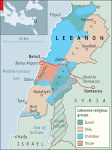
This map, put together by Jeha's Nail, gives you some idea of the geography of the fighting so far, though it may be outdated already.
I slept for about three hours last night before I was awoken at 7:15 by heavy gunfire.
To cut to the chase: according to www.nowlebanon.com, Hezbollah now controls Hamra, Verdun, and Ras Beirut. According to www.naharnet.com, there is currently a gun battle going on on Sadat Street, the road that leads from AUB's campus up to Qoreitem, where majority MP, Saad Hariri's residence is.
According to an anonymous source, who lives in the middle of one of the conflicted areas, Hezbollah is winning neighborhood after neighborhood BUT is immediately turning each neighborhood over to the military. This, in my humble opinion, is a good thing. The military, as I said before, is staunchly neutral (some might argue, too neutral) and non-sectarian. By handing control over neighborhoods to the military, Hezbollah is saying that they do not wish to take over the city (as Nasrallah insisted in his speech yesterday) but rather wish to put the city in the hands of the military. A couple other people I've spoken to think that this strategy could end the conflict relatively quickly.
Nonetheless, there are still armed gunman walking and riding on motorcycles through the streets of Hamra (we've heard this from our neighbors who ventured up there earlier this morning). These men could be the neighborhood militia or Hezbollah supporters, but they seem to be operating fairly strategically rather than chaotically and indiscriminately.
In other important, and not so settling news, there are reports on naharnet.com that the building of the pro-government newspaper Al Mustaqbal has been burned down. According to nowlebanon.com, the pro-government Future News tv channel shut down after receiving threats. Control over the channel has been handed over to the military.
A German news agency (DPA - sorry, I don't have a link) is reporting that Iran has offered a deal (presumably to America) to put the reigns on Hezbollah in exchange for some leniency on their nuclear programs. Some might argue that this sort of move reflects the puppet strings that are really controlling this conflict. As it has been throughout much of its history, Lebanon just happens to be in the center of a much larger geopolitical struggle, in this case between Iran and the United States, with supporting roles played by Syria and Saudi Arabia.

No comments:
Post a Comment